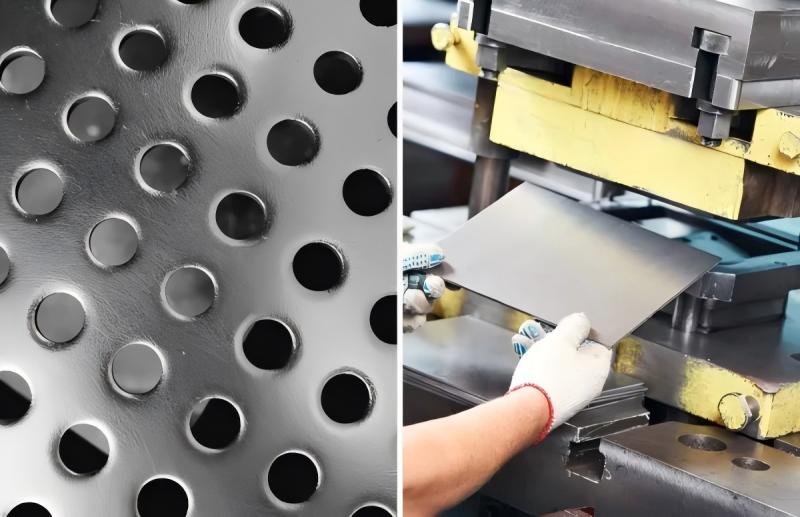Centro de documentação
Manuais e guias técnicos abrangentes para ajudá-lo a dominar as máquinas HARSLE e otimizar sua eficiência na usinagem de metais
Quais processos usam prensas hidráulicas na indústria de conformação de metais?
Prensa hidráulica na indústria de conformação de metais desempenha um papel vital na viabilização de aplicações de alta precisão e alta força em diversos processos de fabricação. Se você atua nessa área, pode estar se perguntando quais técnicas específicas de conformação realmente se beneficiam da tecnologia de prensas hidráulicas. Neste artigo, vou guiá-lo pelos processos essenciais em que as prensas hidráulicas se destacam e explicar por que elas continuam sendo a solução preferida para as operações metalúrgicas modernas.
Principais processos de conformação de metais usando prensas hidráulicas
Estampagem profunda para componentes metálicos ocos

Uma das aplicações mais essenciais das prensas hidráulicas é a estampagem profunda. É o processo usado para moldar chapas metálicas em formas ocas, como tanques de combustível automotivos, pias de cozinha ou latas de bebidas. Uma prensa hidráulica é ideal nesse caso devido à sua capacidade de aplicar pressão constante em todo o curso. Isso resulta em uma conformação mais suave, menos rugas e melhor precisão dimensional em comparação com sistemas mecânicos.
Forjamento de peças estruturais de alta resistência
Quando resistência e durabilidade são inegociáveis, o forjamento se torna o método ideal — e as prensas hidráulicas são perfeitamente adequadas para isso. Essas prensas aplicam uma pressão maciça de forma lenta e uniforme, o que é ideal para conformar peças densas e de alta integridade, como virabrequins, bielas ou suportes de construção. A capacidade de curso de pressão total também permite melhor fluxo de material e redução da tensão interna no componente final.
Corte e puncionamento de chapas metálicas

As prensas hidráulicas também desempenham um papel fundamental nas operações de corte e puncionamento. Esses processos envolvem o corte de formas específicas em chapas metálicas e exigem extrema precisão. Com as prensas hidráulicas, é fácil controlar a força e a velocidade, o que ajuda a minimizar a deformação do material e prolonga a vida útil das suas ferramentas. Seja para a fabricação de juntas, arruelas ou invólucros, este método garante cortes limpos e precisos.
Cunhagem para detalhamento de superfícies finas
A cunhagem é uma técnica de precisão usada para gravar detalhes finos em superfícies metálicas, comumente usada em cunhagem, fabricação de medalhões e ferragens decorativas. Uma prensa hidráulica oferece o controle e a pressão necessários para pressionar padrões complexos profundamente no material sem distorção. Devido à uniformidade da pressão, é a melhor escolha para produzir resultados consistentes e esteticamente nítidos.
Desenhos personalizados de estampagem e relevo

Semelhante à cunhagem, a gofragem e a estampagem são frequentemente utilizadas para aplicar marcas, texturas ou marcas de identificação em superfícies metálicas. Esses processos são especialmente populares nas indústrias de eletrodomésticos e eletrônicos. Prensas hidráulicas oferecem o controle necessário para obter profundidades uniformes e impressões limpas, mesmo em chapas metálicas mais finas.
Benefícios de Prensa hidráulica na indústria de conformação de metais

As prensas hidráulicas são preferidas por um motivo. Aqui estão alguns dos principais benefícios que elas trazem para a conformação de metais:
- Força total durante todo o curso, ao contrário das prensas mecânicas.
- Pressão e velocidade ajustáveis, ideal para formas delicadas ou complexas.
- Desgaste reduzido da ferramenta, graças a movimentos mais suaves e controlados.
- Níveis de ruído mais baixos, tornando-os mais fáceis de usar.
- Eficiência energética, especialmente em sistemas servo-hidráulicos modernos.
Essas vantagens tornam as prensas hidráulicas essenciais em ambientes modernos de metalurgia, onde flexibilidade e precisão são essenciais.
Perguntas frequentes
Por que uma prensa hidráulica é melhor que uma prensa mecânica para estampagem profunda?
As prensas hidráulicas oferecem tonelagem total em todo o curso, permitindo melhor controle do material e menos defeitos em peças estampadas profundamente.
Quais materiais podem ser processados com prensas hidráulicas?
Prensas hidráulicas podem trabalhar com uma ampla variedade de materiais, incluindo aço carbono, aço inoxidável, alumínio, latão e até titânio.
Prensas hidráulicas podem ser usadas para produção de alto volume?
Sim, as prensas hidráulicas modernas são projetadas para produção de baixo e alto volume, especialmente quando precisão e repetibilidade são essenciais.
Quanta manutenção uma prensa hidráulica requer?
Com verificações de rotina adequadas, lubrificação e manutenção de fluidos, as prensas hidráulicas são altamente confiáveis e têm longa vida útil.
Conclusão
As prensas hidráulicas estão no centro de muitos processos essenciais de conformação de metais — seja para trefilação, forjamento, corte ou estampagem. Sua resistência, controle e versatilidade as tornam uma ferramenta indispensável na manufatura moderna. Se você busca aumentar sua eficiência de produção ou explorar capacidades de conformação personalizadas, uma prensa hidráulica é um investimento inteligente.













